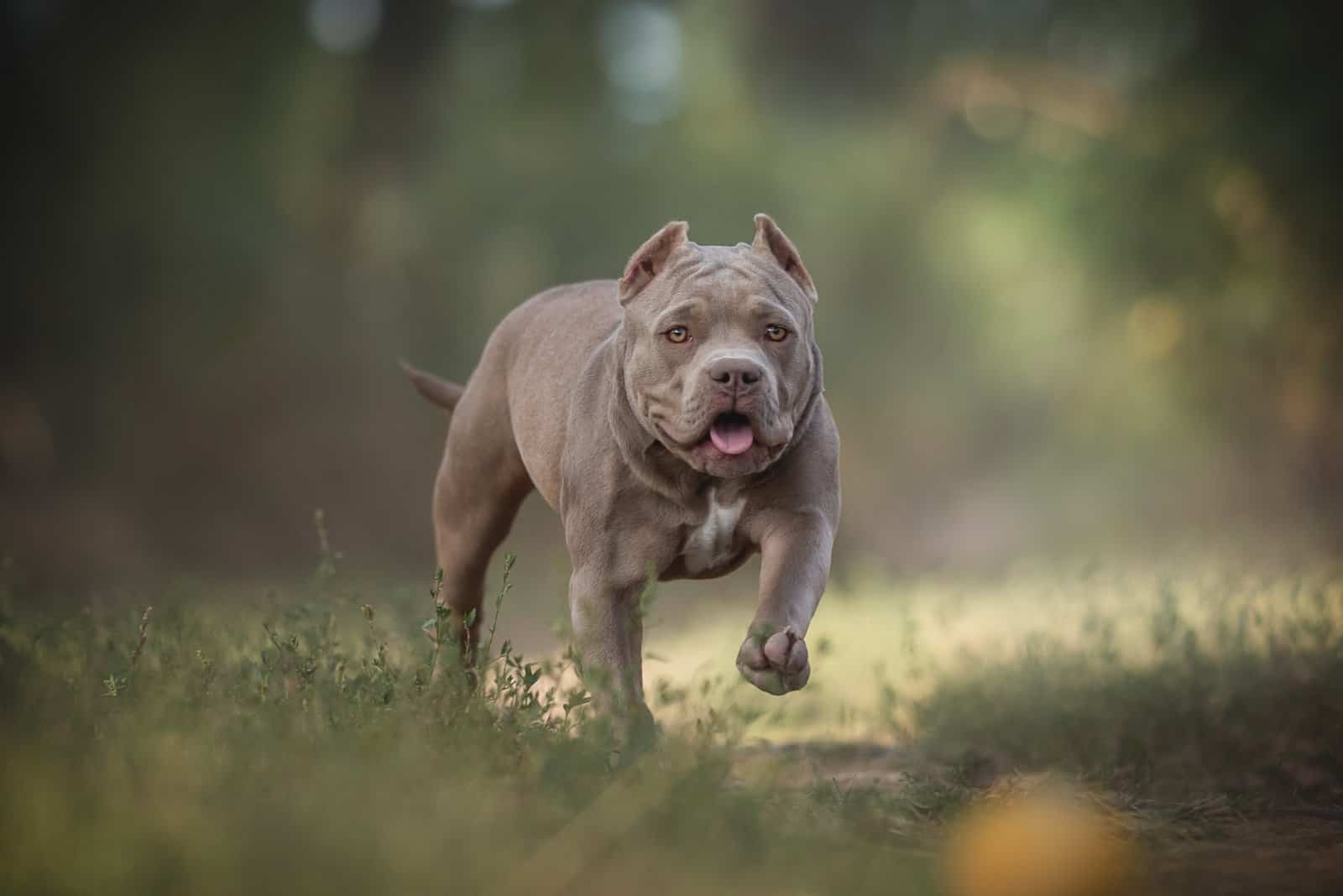Also known as the American Bully, the Pocket Bully belongs to the Pitbull family.
The development of the American Bully dates from 1990 when breeders started crossing different Pitbull dog breeds.
Selective breeding took some time, but in the end, it was all worth it. The breeders came up with the American Bully by combining the desirable characteristics of the UKC American Pit Bull Terrier and the AKC American Staffordshire Terrier.
The Pocket Bully was developed by crossing the American Bully and the Patterdale Terrier.
It is believed that breeders wanted to come up with a dog that would have the most physical traits of the American Pitbull Terrier and a bit altered personality.
The Pocket Bully is not a purebred dog, and therefore, it’s not recognized by the AKC (American Kennel Club).
Back in 2004, this wonderful pooch was officially recognized and registered in the ABKC (American Bully Kennel Club).
And, by the end of 2013, Pocket Bullies were registered within the Companion Dog Group by the International dog registry – the UKC (United Kennel Club).
Dedicated to promoting and protecting American Bully dogs of all sizes – these clubs are considered as two of the most reputable American Bully kennel clubs in the world.
Pocket Bully Dog Breed: What Makes A Pocket Bully?
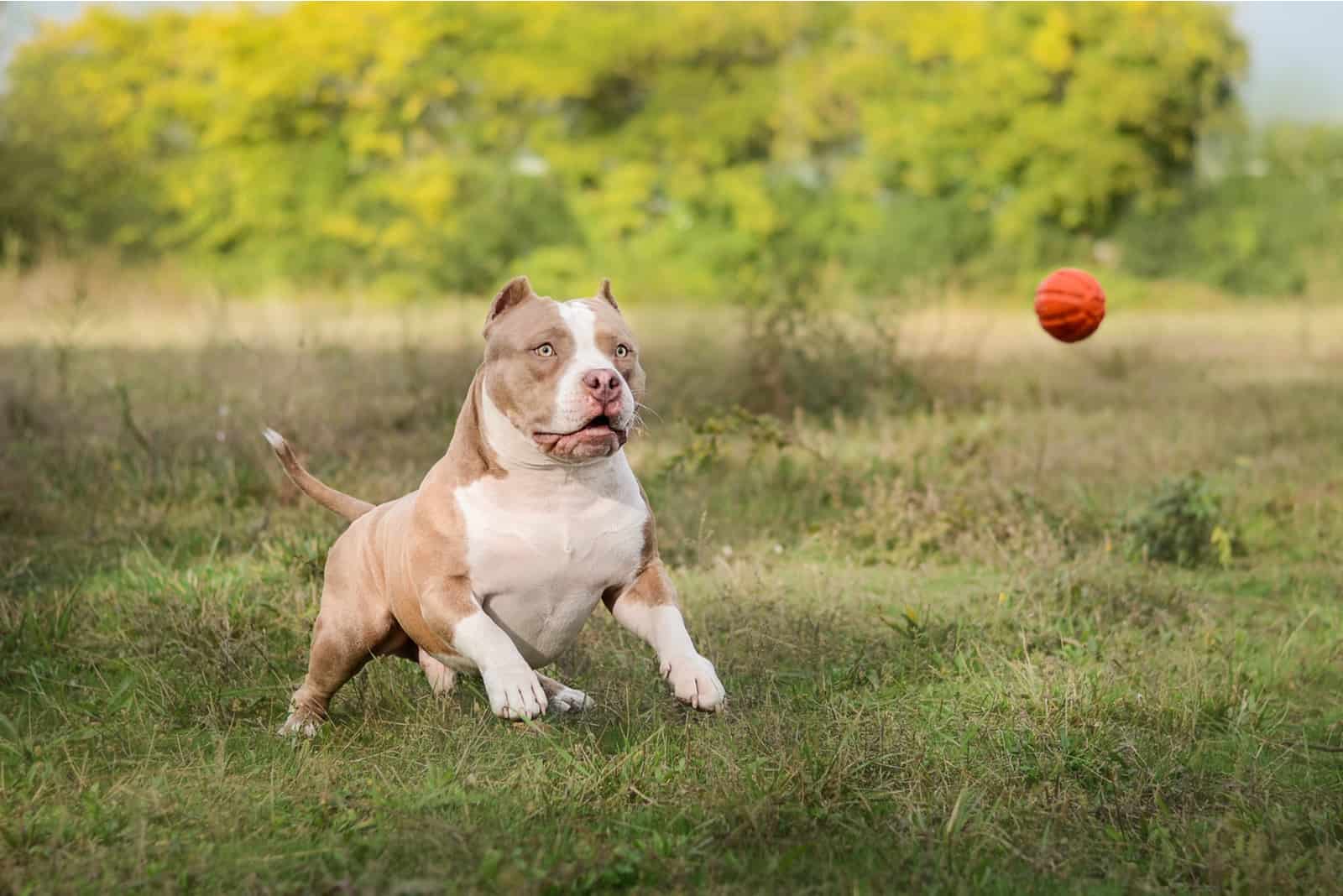
The Pocket Bully is a designer dog derived from the American Bully and the Patterdale Terrier.
The Pocket Bully is actually a mini version of the American Bully. Even though they’re different dogs, they share many similarities. Maybe that’s why some people get confused, thinking these two are the same dog.
We’re here to show you all you need to know about The Pocket Bully dog breed!
A Little Bit Of History
The Pocket Bully is a relatively new mixed breed. It was a little over twenty years ago when Pocket Bullies started becoming popular.
In fact, when the Pocket Bully first appeared, everyone wanted to know more about this designer dog, and soon enough, everyone wanted to have one!
Primarily bred to be a companion dog, this hybrid inherited some of the best family-friendly traits.
Like father, like son… or is it?
Considering that the Pocket Bully’s parent breed is the American Bully, which has inherited some of the personality traits of the American Pit Bull Terrier, there is some controversy about the temperament this hybrid might inherit.
It is believed that the American Pit Bull Terrier is an aggressive breed, which really can’t be further from the truth. But, many think that these dogs are inherently vicious because of their breeding history.
We’ll find out whether these beliefs and speculations are true or not.
As for the Patterdale Terrier, this dog originated in the 1960s, and proved to be an excellent watchdog. They were also used for hunting small animals, which made them develop a strong prey drive.
A combination of two different personalities built on inherited instincts makes the Pocket Bully a unique breed.
American Bully Classification
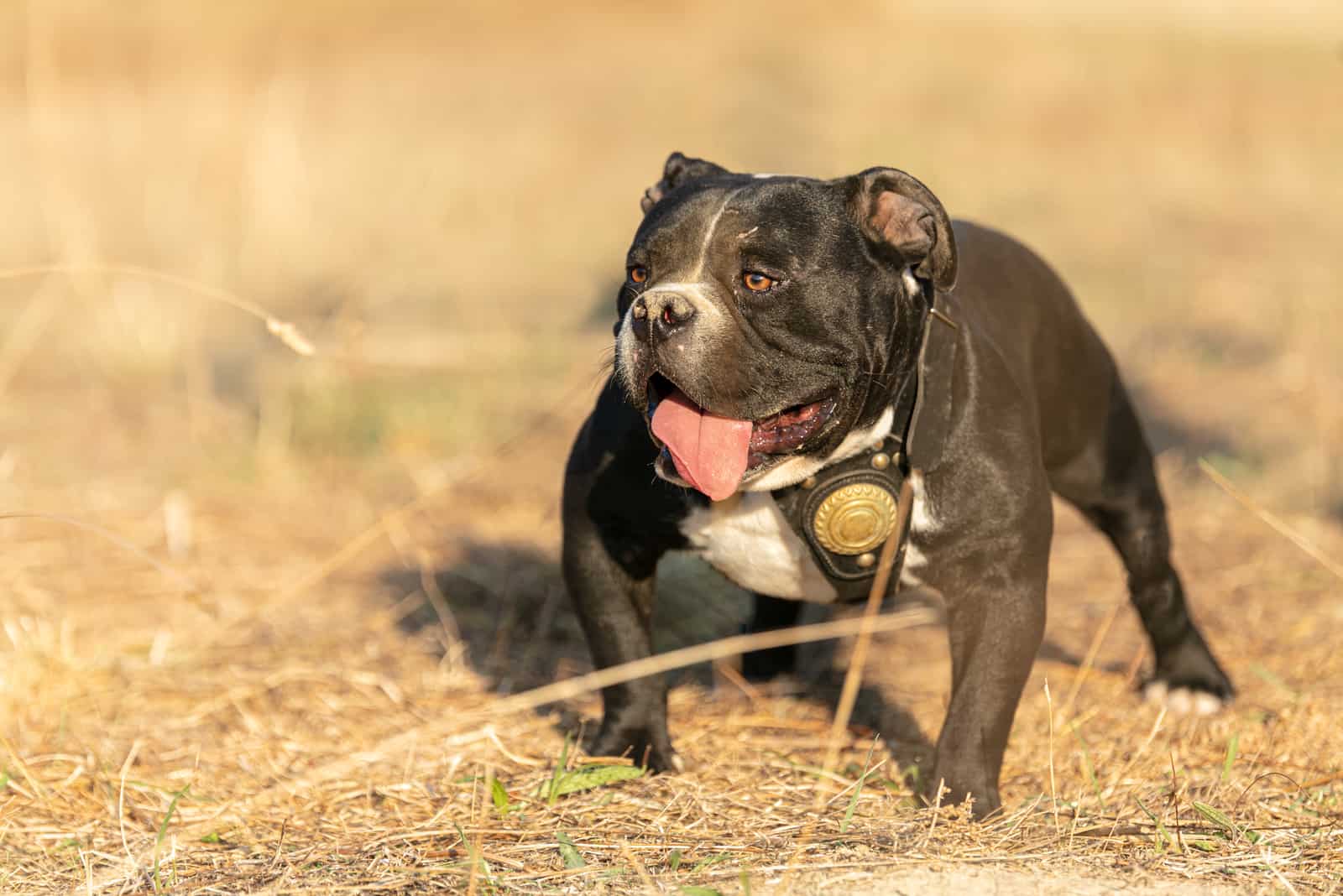
The ABKC (American Bully Kennel Club) came up with specific names for specific body types. It puts the Pocket Bully within five main classes:
1. Pocket Bully
2. Classic Bully
3. Standard Bully
4. Extreme Bully
5. XL Bully
Note that this classification is made according to the different body sizes of the American Bullies. These Bullies are listed from the shortest to the biggest American Bully; the Pocket Bully being the smallest.
There is some further categorization within the subcategories that include the Exotic Bully and the Clean Exotic Bully.
See Also: All The American Bully Types: Sizes, Bloodlines, And More
Pocket-Sized Pitbull?
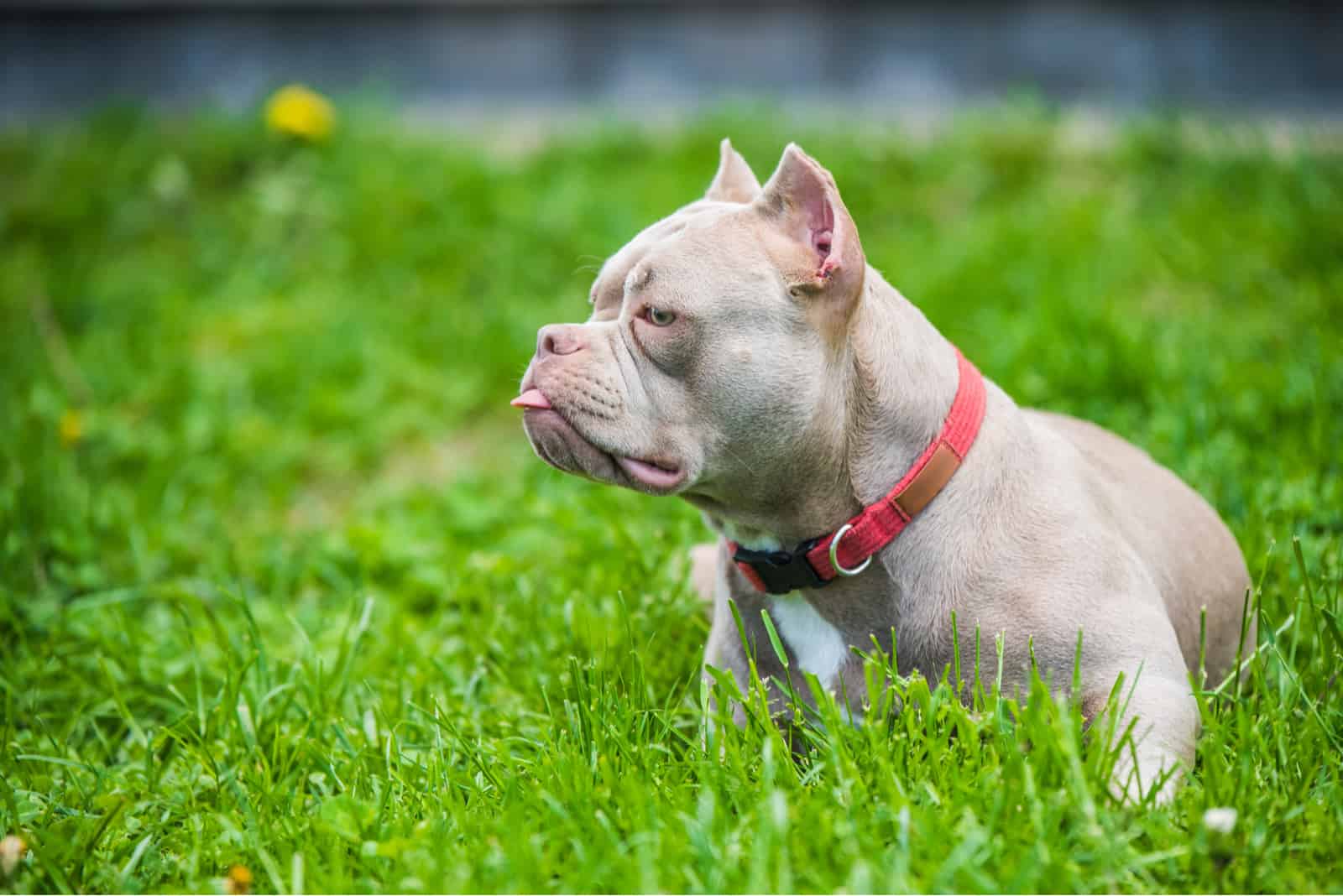
You’re probably wondering – can this Pitbull really fit into a pocket?
Well, not quite.
Even though this designer dog is known by many names like the Mini Pitbull, the Patterdale Pitbull, and the Teacup Pitbull, it doesn’t really live up to these names.
The Pocket Bully is a medium-sized dog. It’s not a small dog like the Teacup Chihuahua or the Toy Poodle. So, it definitely won’t fit into your pocket!
To determine its size, it’s important that we look into the parent breeds’ characteristics.
The Patterdale Terrier’s height ranges from 10 to 15 inches, whereas American Pitbull Terriers grow up to 20 inches.
Normally, their offspring, the Pocket Bully, should grow up to a height ranging from nine to 16 inches. It’s usually the male individuals that grow bigger than their female counterparts.
The Pocket Bully might appear small, but it can get quite heavy. A full-grown Pocket Bullies’ weight ranges from 11 to 24 pounds. This is considered heavy compared to their smaller body size.
Keep in mind that this is just an estimate. We’re talking about a crossbred dog that can differ in height and weight depending on which parent breed it leans more towards.
Appearance
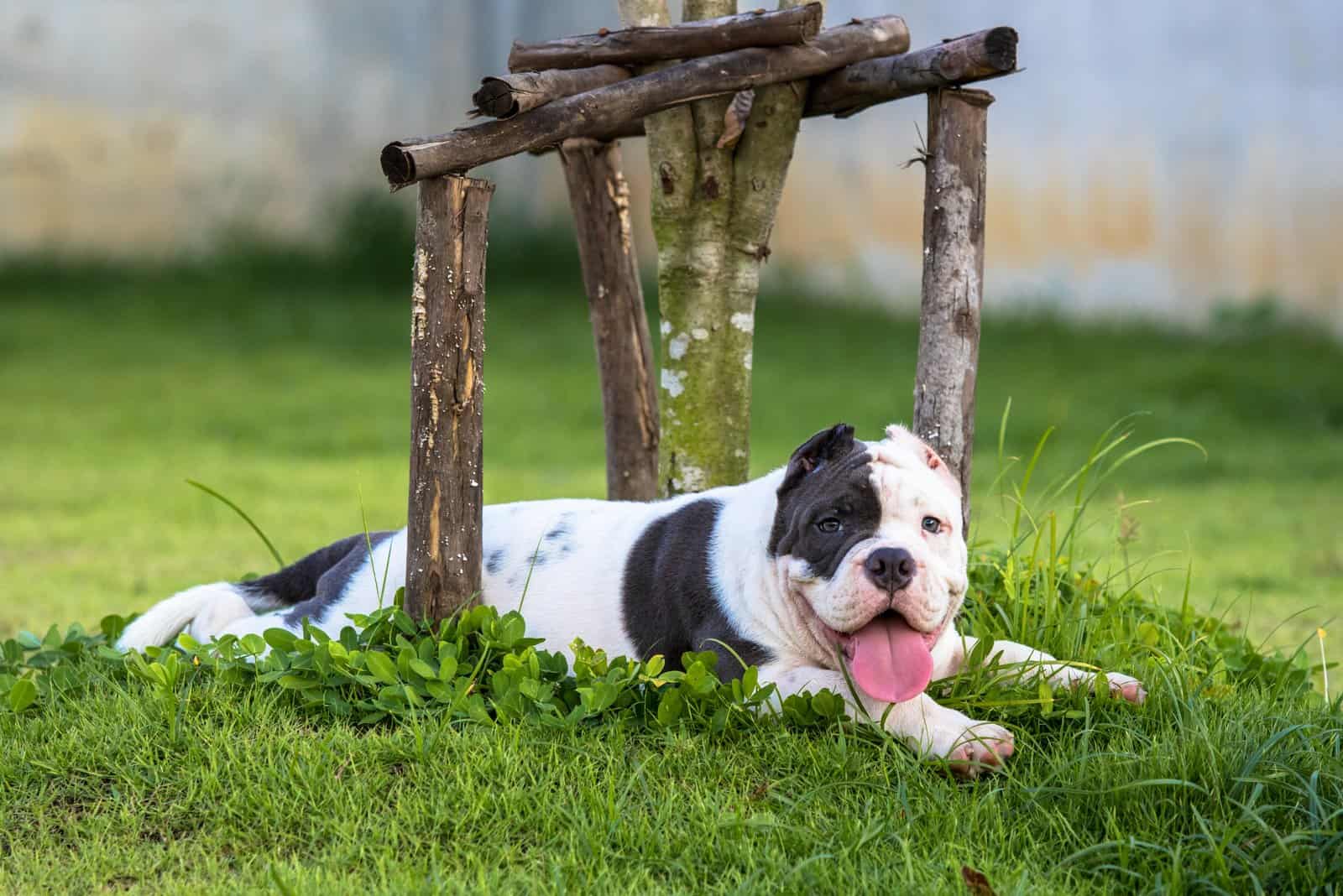
At first glance, the Pocket Bully might have an intimidating appearance that some people link to an aggressive personality. But, that’s definitely not true!
This designer dog is a very unique mix of muscle and strength. Its body type is different from any other breed you’ve seen!
The Pocket Bully is a compact dog with distinct physical characteristics. The muscles on its body are so well defined that it makes you want to ask about its gym routine!
Let’s see what makes the Pocket Bullys’ appearance so special.
Unique body type
The Pocket American Bully is famous for its muscular body. This physical trait has been, for the most part, passed down from the American Bully parent breed.
Not only does it resemble the American Pittie, but it also resembles other bull breeds like the Bulldog, the American Staffordshire Terrier, the American Bulldog, the French Bulldog, as well as the English Bulldog.
The head is the key characteristic
To get a better picture, it would be a good idea to start off by describing its head first. The head shape is the key characteristic of this breed.
It’s very similar to the American Pitbull Terrier, but it’s also very different.
The bone structure and placement are the same as in any dog. But, the Pocket Bully’s head is wider, and made up of strong, thick bones.
Even though its head is big, square-shaped, and bulky, it isn’t too big compared to the rest of the body. In other words, it’s well proportionate to the Pocket Bully’s body.
The “locked jaw” myth
Broad and muscular, its jaw is very powerful. The lower jaw is wide and deep, with lips in adult Pocket Bullies usually hanging downwards.
Due to the structure of its jaw, the Pocket Bully has a very recognizable ear-to-ear smile!
You might have heard of some myths regarding the Pitbull’s “jaw lock”. Neither this dog nor any other dog has the ability to “lock” its jaw in place.
This is usually used to describe the dog’s determination when it grabs onto something and decides not to let go.
Also, this doesn’t mean that the dog is vicious and aggressive. The Pocket Bully’s lower jaw is not that strong anyway.
Short- to medium-sized neck
The broad head stands on a very broad neck. Both the head and the neck are heavy and muscular, without wrinkles or excessive dewlap.
Dewlap is that chunk of skin we see hanging from the neck of Mastiff-type dogs and Bloodhounds.
Now, the Pocket Bully is all muscle, so there are no dewlaps to be seen here.
The neck is medium-sized, retracting from the shoulders to the back of the skull. Its wide structure makes it look as if the Pocket Bully’s head is directly connected to its body, making the dog look bulkier.
Broad chest
The first thing you will notice when you look at the Pocket Bully is its wide and muscular chest. Because of this, the forelimbs stand more apart from each other than on average dogs.
The short legs and shallow chest contribute to the Pocket Bully’s low-level back posture.
Many colors of a Pocket Bully
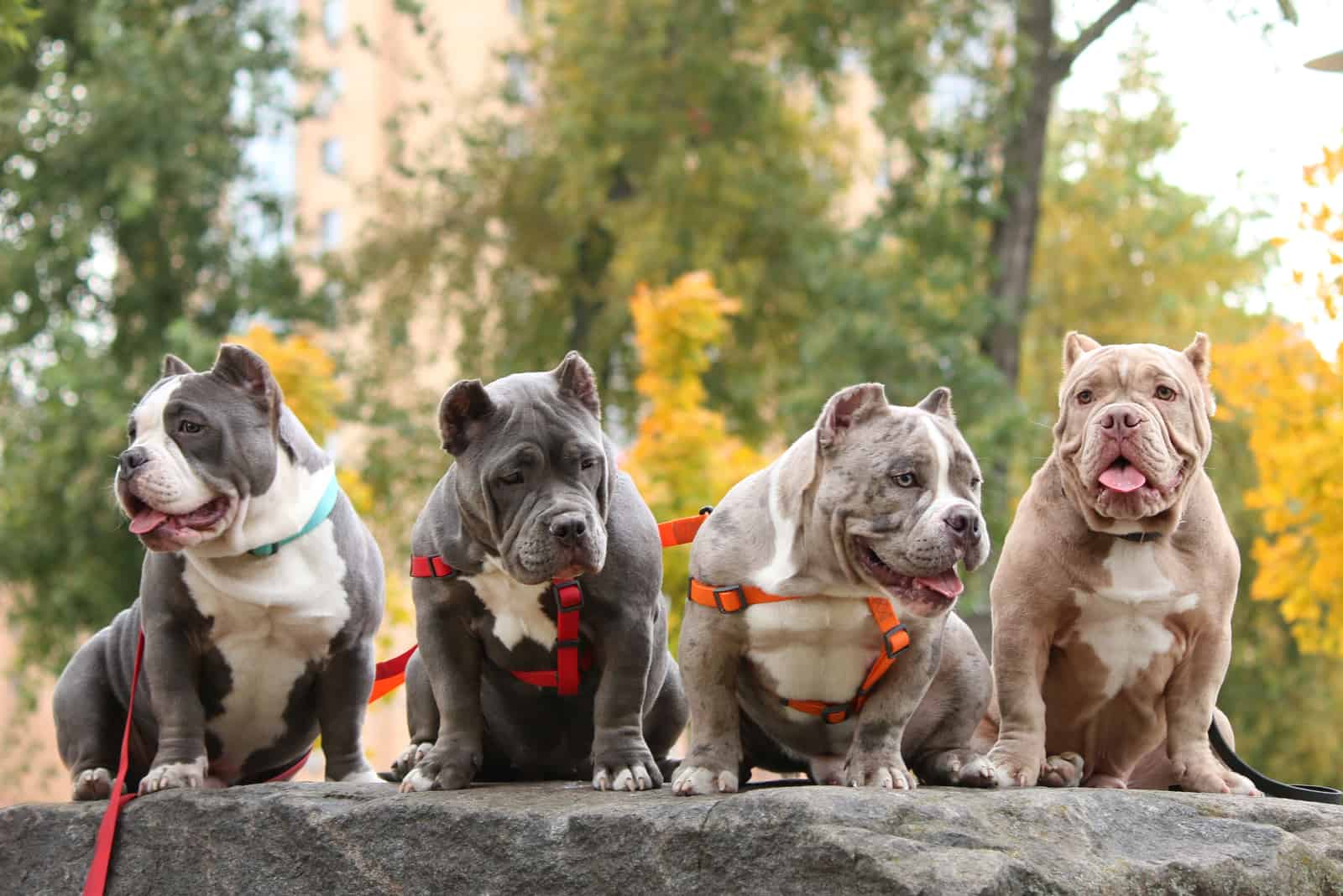
The Pocket American Bully comes in a tri-color pattern. This means that their coat is colored in three colors: one being the base color, and the other two are tan colors.
There are so many color variations in Pocket Bullies that it’s almost impossible to name them all! This is due to a huge number of the Pit Bull color variations. Most Pocket Bullies will inherit any kind of color within the Pit Bull family.
The most common base coloring is black. Other base colors include blue , light brown, red, and white. Other less common colors include brindle, fawn, smutt, and sable.
Some Pocket Bullies will be born in only one color, while some will have distinct markings and patterns.
When base colors are combined with tan colors, we get many shades of the Pocket Bully’s coat colors.
Alongside base colors, here are some of the most famous tri-color variants of the Pocket American Bully:
• Blue tri color
• Chocolate tri color
• Lilac and black tri color
• Ghost tri color
• Piebald tri color
• Ticked tri color
• Champagne tri color
Coat type
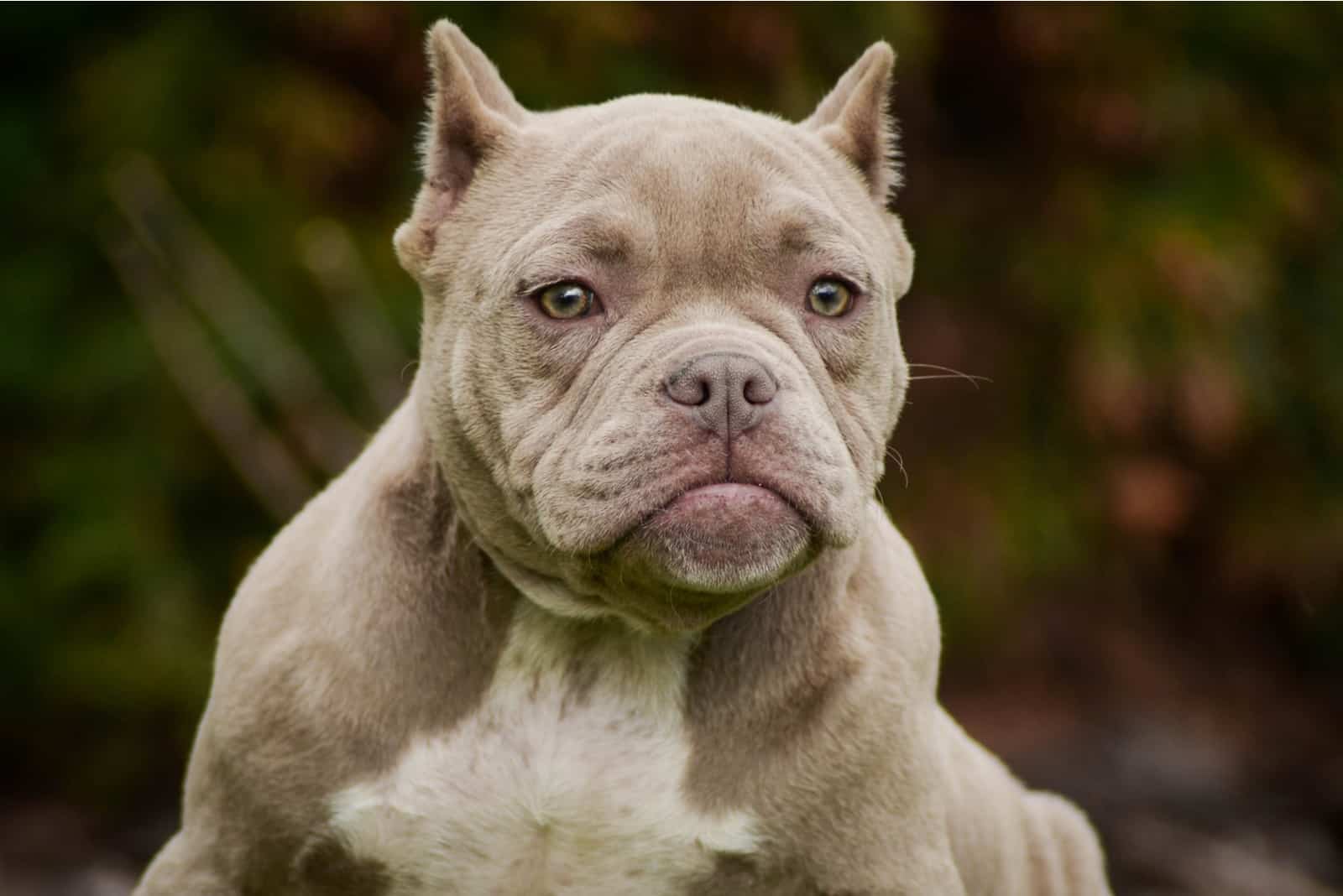
Their coat comes in different colors, but they also come in different lengths! Now, this all depends on the parent breed’s genes.
So, Pocket Bullies usually look like their American Bully parents, which means their coats are alike.
The Pocket Bully will have a short coat with a shiny effect. Depending on the color of the coat, the shine can be greatly enhanced.
Pocket Bullies are usually single-coated, meaning they don’t have an undercoat. This might be an issue during colder days, so make sure you get your Pocket Bully some warm clothes!
Due to this, the short-haired Pocket Bullies don’t shed much.
What happens if the Pocket Bully leans more towards its Patterdale Terrier parent? You get a double-layered designer dog.
In this case, the Pocket Bully will look more like its Patterdale Terrier parent, and it can inherit any of three types of coats: rough, smooth, and broken.
Pocket Bully Grooming And Maintenance
The Pocket Bully’s coat is very easy to maintain!
Because its coat is usually short and single-layered, it won’t go through extensive shedding periods. This means they’re medium-shedders, and you won’t have your hands full with hair and fur.
Regular grooming is a must in order to keep the coat shiny and healthy. It will also help get rid of dead skin cells.
The Pocket Bully doesn’t require frequent bathing. Once a week or two will be more than enough. Too much bathing makes the natural oils from their skin disappear, which can lead to skin problems.
Of course, you will have to give your Pocket Bully a bath if it decides to go out and play in the mud all day!
Also, always remember to use dog-friendly shampoos and similar products. Never use human shampoos to bathe your Pocket Bully.
Is A Pocket Bully An Aggressive Dog Breed?
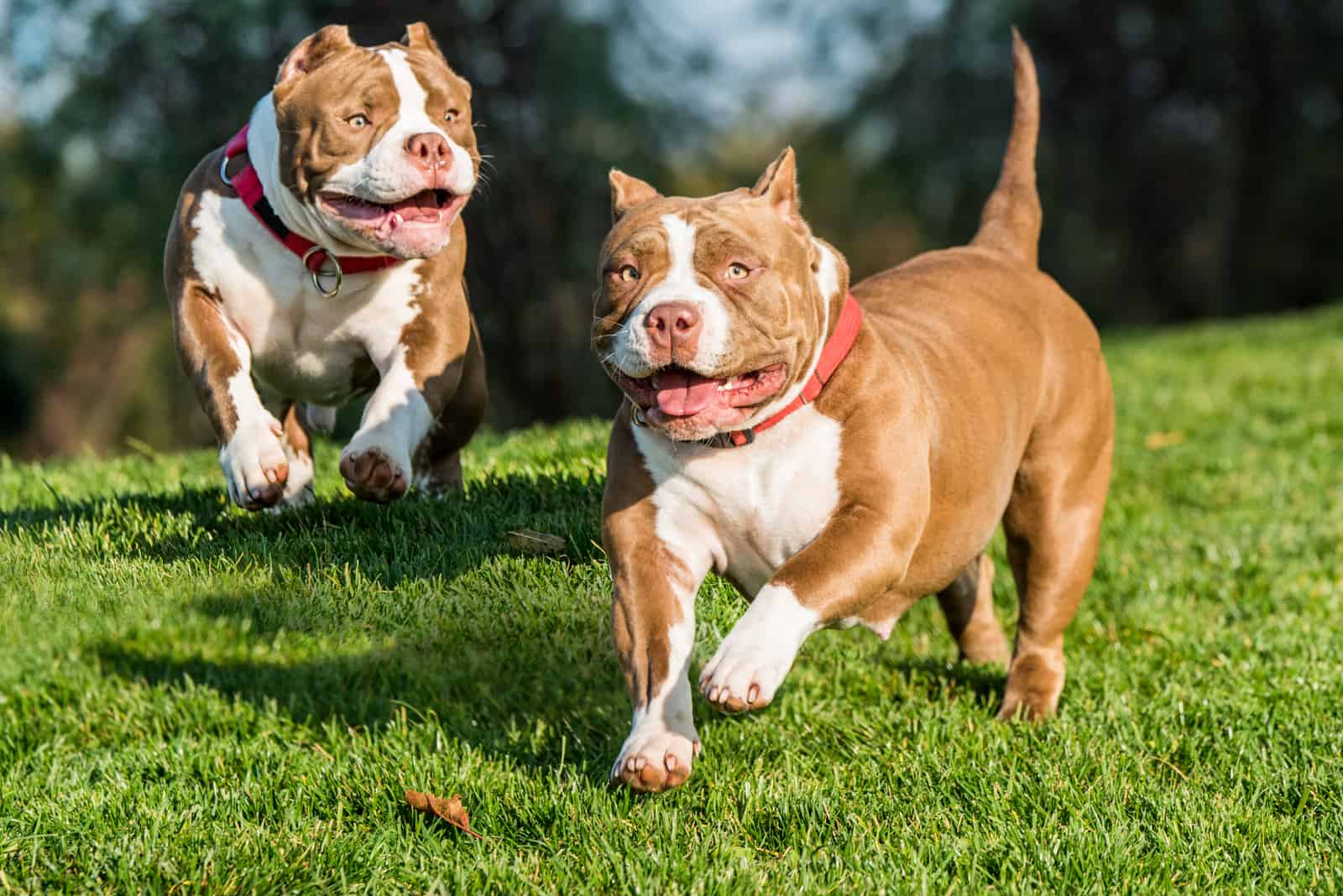
The short answer is NO!
The Pocket Bully is the mere opposite of an aggressive dog breed. In fact, this dog is considered one of the best family pets. And, here’s why!
This designer dog is a well-behaved, good-natured puppy that loves his friends and family. You probably haven’t seen a more loving and affectionate pooch than the Pocket Bully!
After all, the sweet nature is what got the Pocket Bully on top of the most wanted dog breeds in the U.S. It’s hard to resist those cute puppy eyes!
Pocket Bullies have inherited the best personality traits from both parent breeds. They’re intelligent, obedient, highly trainable, and loyal. This means that a Pocket Bully will require lots of mental stimulation and physical activity!
In fact, most Pocket Pitbulls resemble their American Pittie parents more, both in looks and in personality.
Sometimes, a Pocket Bully might show its stubborn side and a moderate prey drive inherited from the Patterdale Terrier parent.
Early socialization, regular training, and quality playtime are very important in order to avoid unwanted behavior later in life.
Your Pocket Bully will be grateful for all the love and attention it will be getting!
Why do people think Pocket Bullies are aggressive?
Unfortunately, this question has been asked a lot. And, it is mostly asked because of the bad reputation American Pitbull Terriers got.
American Pitbulls are usually labeled as aggressive towards humans and animals. They’re even banned in some countries.
These dogs got their bad reputation because they were in the wrong hands. And, by wrong hands, we mean that the people who owned American Pitbulls didn’t treat them right by raising them into aggressive dogs.
The truth is, American Pitbull Terriers are very good dogs. They’re loyal, affectionate, and protective. This makes them wonderful family dogs that get along well with both children and adults.
On the other hand, the Patterdale Terrier dog breed is considered as an intelligent, energetic, and overall good-natured dog.
A combination of these two will most likely win the crossbreed lottery! The Pocket Bully will inherit some of the parent breed’s personality traits, which will intertwine with one another in a very unique way.
The human factor is very important when discussing the breed’s temperament. Quality training and socialization will make every dog a fun, loveable life companion.
So, remember – a dog’s behavior is greatly influenced by your behavior towards it!
Pocket Bully Health Issues
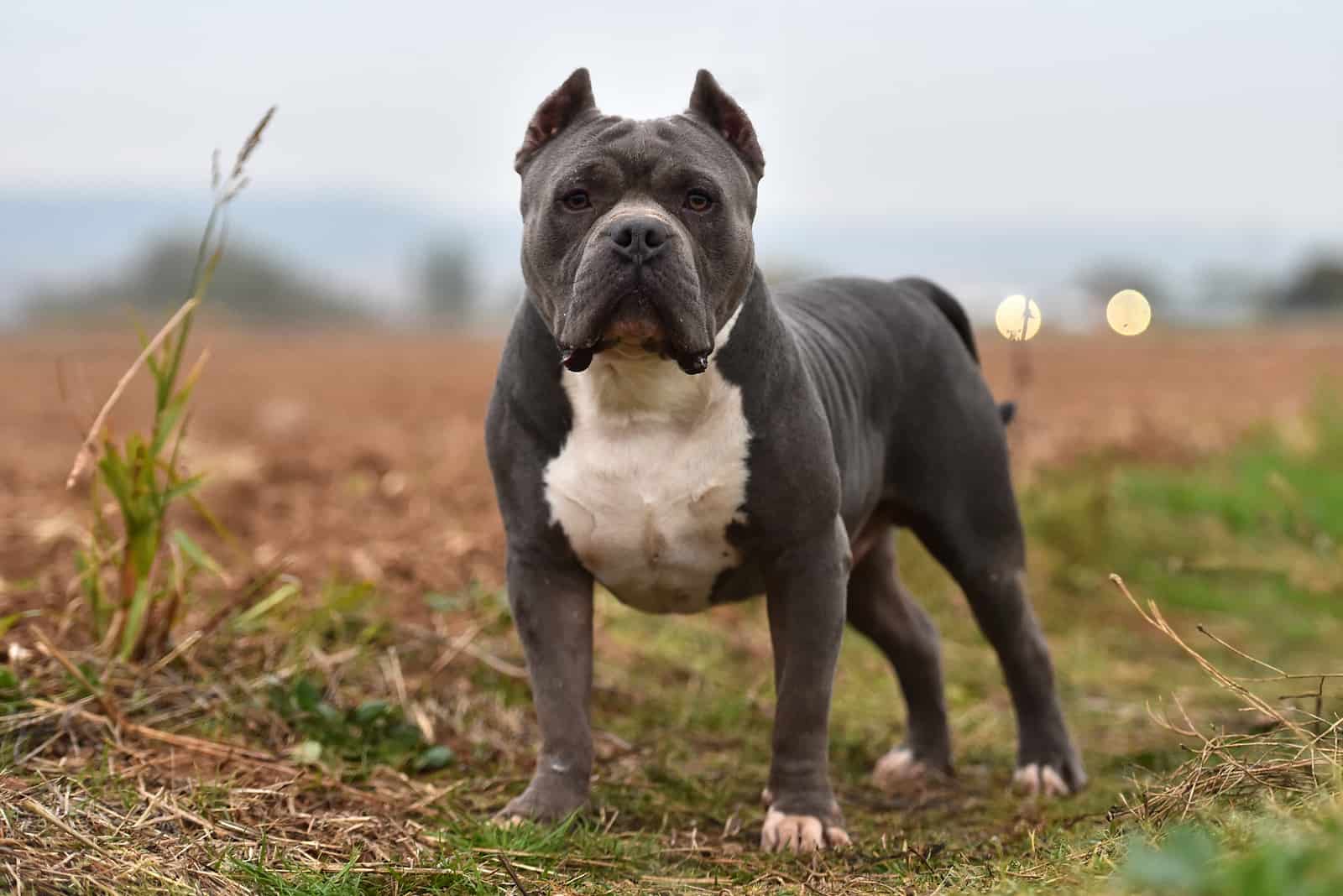
Mixed breed dogs are known to be healthier than purebred dogs. So, is this the case with our beloved Pocket Bully?
Well, there are some common health problems that many of the members of the bulldog family face during their lifetime.
Health problems are caused by selective breeding. Most diseases and syndromes are passed down from the purebred parent breed.
Although the Pocket American Bully is a very healthy crossbreed, there are some health issues to watch out for.
Considering its parent breeds, the Pocket Bully may be prone to:
• Hypothyroidism
• Hip dysplasia
• Heart diseases
• Eye problems
• Diabetes
• Skin diseases
As we have mentioned, the Pocket Bully is quite a healthy designer dog. This means that most of the potential diseases might not even occur during its lifetime.
Reputable breeders will pay close attention to developing quality bloodlines with the healthiest American Bully puppies. So, make sure to do some research about reputable breeders in your area.
It’s important to know that you can do your part in preventing a disease by taking your dog to the vet for regular checkups and treatments.
A healthy Bully is a happy Bully!
Pocket Bully Diet And Nutrition
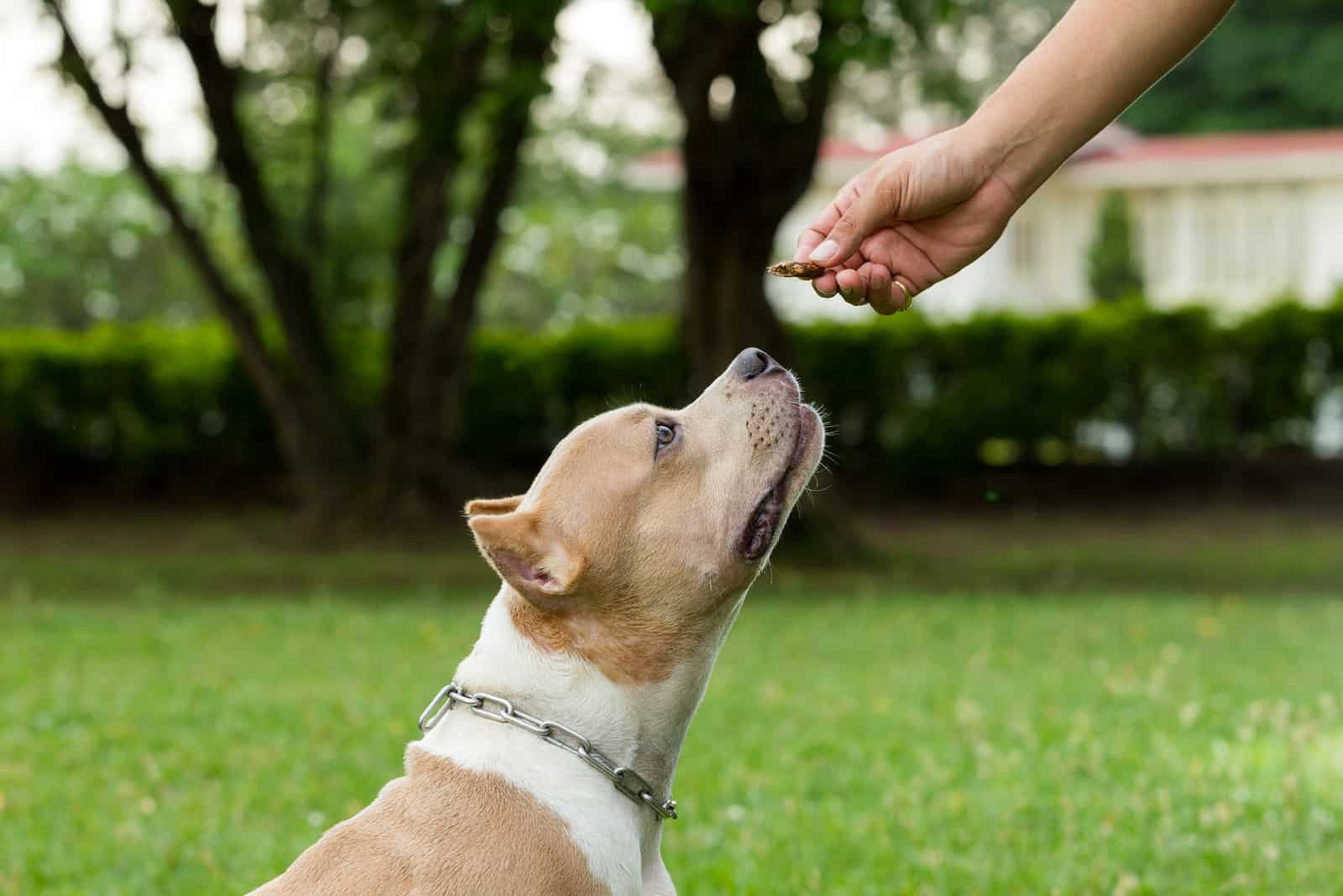
When it comes to diet and nutrition, Pocket Bullies are no different than other dog breeds. But, they do have a big appetite, though. Because of this, new owners should be careful as to how much they feed their new pup.
During the Pocket Bully puppy’s transition from its mother’s milk, it starts to eat puppy kibble. At this stage, it’s important to get the best quality puppy kibble you can find.
The new diet after weaning means a lot to a small pup. High-quality dog food will help your Pocket Bully puppy grow into a strong and healthy adult.
Not only that, but high-quality dog food will also help the dog’s immune system by making it tougher and more resistant to diseases.
A good immune system will help fight against any viral or bacterial disease your pup might get, especially inherited health problems.
Daily feeding
Now, to be more specific – adult Pocket Bullies usually need around 400 to 500 calories daily. This may seem a lot, but keep in mind that these dogs like to be active, and if they engage in proper daily exercise, they’ll burn most of these calories.
This means that it will be enough to feed them two meals per day – breakfast and dinner. Each meal should be made with two cups of high-quality dog food.
Between these meals, you can occasionally feed your Pocket Bully treats and snacks. But, do keep those at a limit. Too many treats will make your dog obese, and Pocket Bullies tend to be prone to obesity.
So, say no to those cute, irresistible puppy eyes that are looking at you and waiting for an extra treat!
Use yummy treats and snacks for positive reinforcement training. Not only will your dog love these treats, but it will also learn quicker and better.
When it comes to feeding your dog people food, there are some things you should know. Some foods are toxic to dogs and must be avoided at all times. Therefore, it’s best to do some research concerning this.
Here are some foods to avoid feeding your dog:
• chocolate
• macadamia nuts
• dairy products
• candy
• corn, onions, garlic
Of course, this is just a brief list. There are many foods, drinks, and plants that you should be cautious about since the Pocket Bully likes to eat whatever it gets its mouth on!
Pocket Bully Exercise And Training
Daily exercise and training are fun activities for both the pet and the owner. Spending quality time with your new four-legged best friend in the park is something that you just don’t have the words to describe.
Both the dog and the owner will benefit from everyday activity and quality playtime. Luckily, the Pocket Bully won’t be too energetic, and you will be able to keep up with it!
But, the Pocket Bully is still a very energetic and active dog that will need some running time each day. Running, jumping, playing fetch, chasing the ball, and similar activities help the Pocket Bully achieve its muscular build.
During exercise, each muscle of the body is in full function, and the body is burning all the excess calories. So, keep your dog healthy by taking him out for daily exercise!
Training a Pocket Bully shouldn’t be difficult because this is a very intelligent and obedient dog. This dog is even more obedient when tasty food is in the game!
Positive reinforcement training is always a good idea. Your dog will do its task correctly, and it will get a yummy treat. It’s a win-win situation – you get a paw, the Bully gets a treat!
It is important to go through early socialization. This step is crucial in order to prevent undesirable behavior. After all, Pocket Bullies inherited a bit of a prey drive, so we don’t want them chasing small animals around.
Introducing your Pocket Bully to other pets and people at a young age will be very beneficial, and will result in good behavior in adulthood.
How Long Do Pocket Bullies Live?
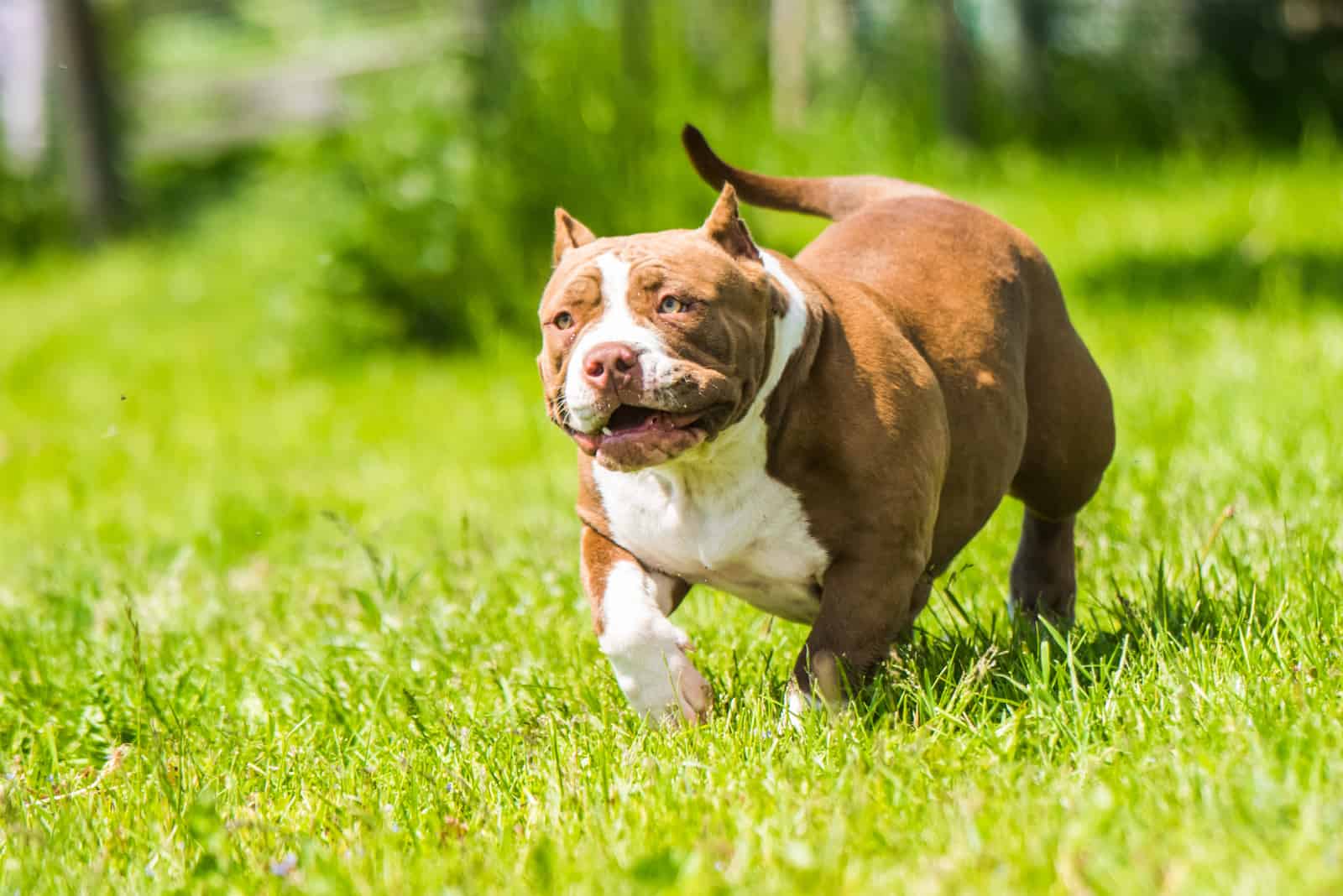
Pocket Bullies are a dog breed that is known to live a fairly long life. The average lifespan of a Pocket Bully ranges between 10 and 14 years.
Since the Pocket Bully is a mixed breed, its parent breed should be considered for an estimated lifespan. The American Bully inherited the American Pit Bull Terrier’s long lifespan, which ranges from 12 to 14 years. This is one of the factors that contribute to the Pocket Bully lifespan.
The lifespan of a Pocket Bully is greatly influenced by its health condition.
Some genetically inherited health issues might appear earlier in life; some might appear later. It all depends on the genetics, the environment, the diet, the nutrition, and overall care.
Before deciding on getting a Pocket Bully puppy, you should consider the inherited health issues that might lead to a shorter lifespan.
How Much Does A Pocket Bully Cost?
Considering that it’s a mixed breed, you might think the Pocket Bully wouldn’t be as expensive as a purebred Pitbull. But, it might be one of the most expensive designer dogs out there.
Since it became so popular and high in demand, many breeders value the Pocket Bully at around $1000. And, that’s the starting price.
Read More: 5 Pocket Bully Breeders In The UK: Only Mighty Paws
Although they’re high in demand, it’s not so easy to find a Pocket Bully. This is also why their price goes higher.
When getting a Pocket Bully, it’s important to search for reputable breeders who specialize in breeding this dog breed.
Venomline is the most famous American Bully bloodline. Over the years, it has produced several ABKC Pocket American Bully champions.
Due to their high-quality pedigrees, these dogs are very expensive. The prices of these Pocket American Bullies range from $8500 to $20,000.
The Venomline has been developed from a purebred micro Pocket American Bully called Venom. This dog produced some of the sturdiest Bullies. Venom is known as the world’s most expensive dog, at the price of a whopping $500,000!
What you should also consider is that a different color of a Pocket Bully might have an influence on the price. Usually, rare colors and markings mean higher prices.
Read More: How Much Does an American Bully Cost
To Sum It Up
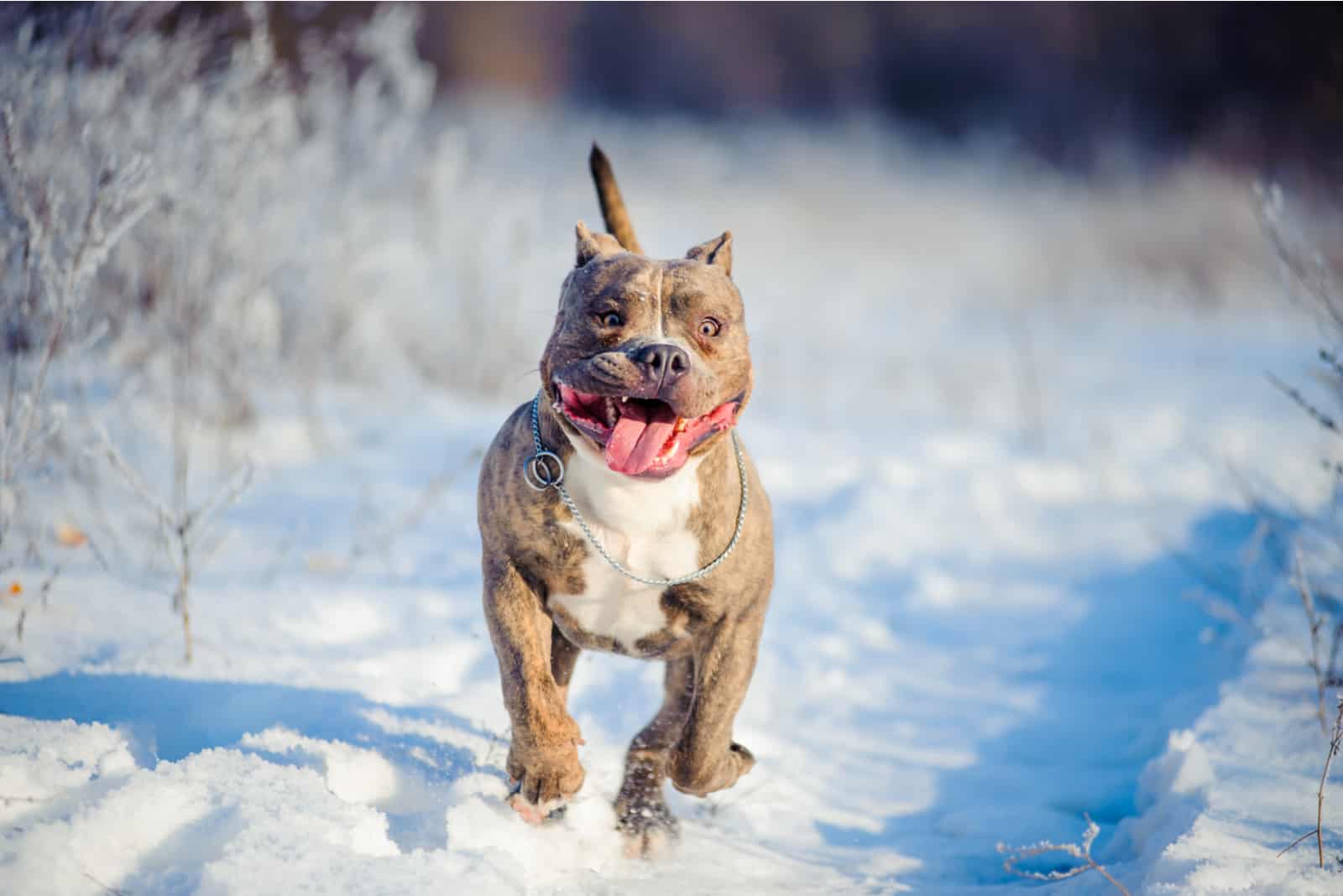
The Pocket Bully is a family dog known to be very devoted to its owner. It will do its best to protect and guard its family.
What the Pocket Bully also does best is cuddle! This bulky ball of fur is a big cuddle machine! Its size makes the Pocket Bully the perfect, huggable lap dog.
This designer dog gets along well with children of any age. It might not get along with other pets, so it’s best to introduce it at a very early age.
Its short coat is easy to maintain, so you won’t have to worry about all the hair on your furniture and clothing.
This is a relatively healthy mixed breed; regular veterinary checkups will do just right.
The Pocket Bully is an active dog – that’s right, they’re very athletic and outgoing. So, don’t expect to spend your days laying on the couch because the Pocket Bully won’t have it!
Read Next:
• Bully Breeding 101: Everything You Need To Know About Bullies
• Here Are 8 XL Bully Breeders You Can Trust!
